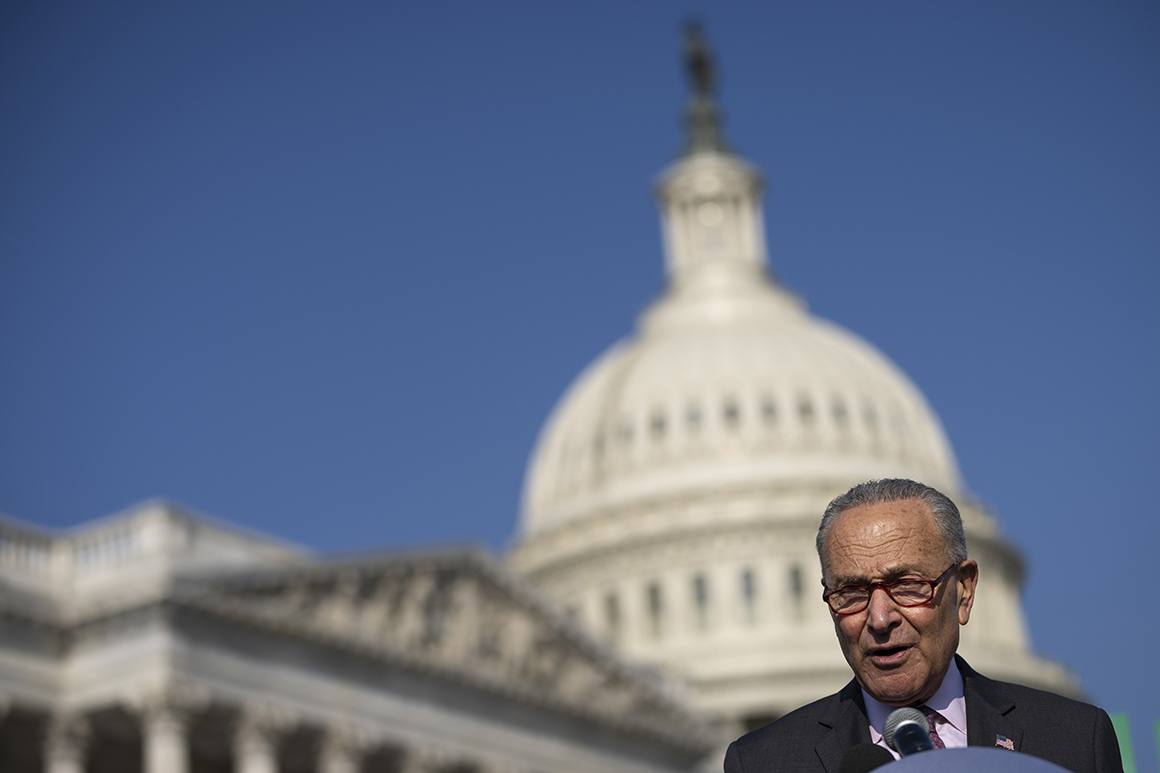The Senate’s already-delayed annual defense policy bill faced yet another roadblock on Wednesday, throwing the timing of the must-pass legislation into further doubt as lawmakers looked to include a China competitiveness bill.
Senate Majority Leader Chuck Schumer delayed an initial procedural vote on the National Defense Authorization Act on Wednesday morning, amid disagreements over the New York Democrat’s push to add long-stalled China competition legislation to the defense bill.
The China bill is a top priority for Schumer, but Sen. Jim Inhofe, the top Republican on the Senate Armed Services Committee, said GOP senators were prepared to vote against the procedural motion on the defense bill if Schumer tried to add the China legislation without holding a separate vote on it.
“We’re not ready for a motion to proceed until we know what we’re proceeding to,” Inhofe told reporters. “It’s just an unnecessary obstacle. … That’s what’s holding it up now. It’s Schumer doing something unprecedented in as long as I can remember.”
Sixty votes are needed to advance the bill, so Republicans could stall floor debate if they oppose the procedural motion.
The U.S. Innovation and Competition Act passed in the Senate in June with bipartisan majorities, but has stalled in the House, where committee chairs are seeking to change the legislation but have made little progress in recent months. It would authorize funding for scientific research and development as a way to counter China’s technological advancements and also outlines new spending to boost the U.S. semiconductor industry, which has lagged amid the recent supply chain backlog.
The push to include the bill in a planned manager’s package of bipartisan and largely uncontroversial amendments forced senators to shelve the procedural vote to advance the defense bill, which was initially set for Wednesday morning.
“Trying to get together what’s in that package up front is the key,” Senate Foreign Relations Committee Chair Bob Menendez (D-N.J.) said.
On the floor Wednesday morning, Schumer said the delay would give space for senators to continue to work out the details, but said the chamber must "move forward on this bill and quickly."
“We’re continuing to work with our Republican colleagues to strengthen the substitute with as many amendments from senators as possible,” Schumer said. “We’re making really good progress, and so we’ll give the Armed Services Committee more time this morning to review the text and come to a final agreement.”
While the objections to the China bill in the Senate are merely procedural, top House Democrats — who have not passed their own version of the bill — have expressed reservations about being forced to swallow the Senate legislation in its entirety as part of the annual defense legislation.
Senators who backed the China package this summer are largely supportive of Schumer’s push to attach it to the defense bill, despite House Democrats’ reluctance. With only a handful of legislative days left before the end of the year, lawmakers are trying to avoid a year-end pile-up of key legislation.
“Putting anything on the NDAA, if it’s possible, increases the likelihood of [the added item] passing by many orders of magnitude,” Sen. Brian Schatz (D-Hawaii) said.
Sen. Tim Kaine (D-Va.) supports Schumer’s push and said the House’s delays in passing the China bill have been unacceptable.
“I would have thought there would have been something with the bill from July to now, and I think this is a good way of getting it on the table,” Kaine said. “It’d be a big win for the country if we get it done. And let’s get it done in this vehicle if we can.”
House Speaker Nancy Pelosi has been relatively mum on her posture toward the China competition bill, but Schumer’s allies said it was unlikely that the majority leader would be pushing to attach it to the NDAA if Pelosi told him it would sink the defense bill.
“It’s certainly a little mystifying why the House doesn’t see the same urgency we do on building a coherent China policy,” Sen. Chris Murphy (D-Conn.) said. “I think we’ve been waiting all year for the House to put together a process that at least creates a version of USICA that could get us to [a conference committee]. My feeling is some of us are kind of done waiting.”




















